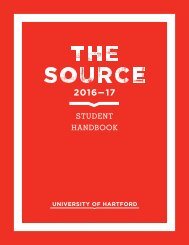advising
You also want an ePaper? Increase the reach of your titles
YUMPU automatically turns print PDFs into web optimized ePapers that Google loves.
ALL-UNIVERSITY CURRICULUM<br />
All-University Curriculum<br />
The All-University Curriculum (AUC), the University’s nationally<br />
recognized interdisciplinary program, is committed to educating<br />
students broadly by exposing you to fundamental areas of knowledge<br />
and by challenging you to go beyond your chosen specializations.<br />
Faculty who developed the curriculum selected classical and<br />
traditional knowledge that has value for today. They also identified<br />
knowledge in the social sciences, business, engineering, and<br />
technology necessary to prepare graduates for the contemporary<br />
world. All of these areas of study are integrated in interdisciplinary<br />
courses in which you examine in-depth problems, ideas, and issues<br />
from multiple perspectives.<br />
All-University Curriculum courses also emphasize the development<br />
of essential abilities and skills. These include the ability to<br />
speak and write, think, make decisions, take action, and apply<br />
knowledge effectively. Values identification, social interaction,<br />
and responsibility for civic life are included as essential abilities. Each<br />
course emphasizes the development of two or three of these abilities<br />
throughout the semester. For example, Western Heritage emphasizes<br />
written communication and values identification; Living in the<br />
Environment emphasizes oral communication and responsibility<br />
for civic life. Written feedback, conferences with instructors, in-class<br />
activities, and group assignments encourage students to develop their<br />
essential abilities.<br />
In addition, courses in the All-University Curriculum are<br />
developed to stimulate active learning. By using creative and<br />
interactive teaching styles, the faculty encourage you to take<br />
responsibility for learning. The courses are intended to create a<br />
challenging and supportive community in which students and faculty<br />
join together in shared learning experiences.<br />
All students in baccalaureate programs are required to take at<br />
least four All-University Curriculum courses over their four years<br />
as part of graduation requirements. Multiple sections of each of<br />
the 25 courses in the curriculum are offered each semester. You are<br />
required to take one course from four of the five breadth categories,<br />
for a minimum of 12 AUC credits. The AUC committee, along with<br />
college faculty, determines which category may be waived for majors.<br />
Students may take an additional AUC course as an elective. The five<br />
breadth categories are as follows:<br />
Living in a Cultural Context: Western Heritage—AUCW<br />
Courses in this category seek to develop a knowledge of Western<br />
culture. We live in a blend of constantly changing societies and need<br />
to understand both how such societies function and how they were<br />
developed. In order to participate effectively as citizens, students<br />
need to understand past events and their links to present ones.<br />
Living in a Cultural Context: Other Cultures—AUCC<br />
Courses in this category seek to develop cultural empathy and an<br />
ability to project imaginatively into different cultural worlds; and to<br />
appreciate the richness, complexity, and importance of other ways of<br />
living. This category provides access to a diversity of cultures and to<br />
the traditions, values, and practices that inform those cultures.<br />
Living Responsively to the Arts—AUCA<br />
Courses in this category engage the imagination, foster flexible<br />
ways of thinking, and provide distinctive ways of understanding<br />
human beings and nature. Knowledge of architecture, art, dance,<br />
drama, literature, and music opens channels of communication and<br />
leads to a realization of the complexities and interrelationships of<br />
human society.<br />
Living in a Social Context—AUCS<br />
Advising Information: 860.768.4705<br />
Courses in this category are designed to provide students with an<br />
understanding of themselves and how they relate formally and<br />
informally with others in groups, institutions, and political and<br />
economic contexts. Courses emphasize human needs and behaviors;<br />
group relationships and processes; the evolution and nature of<br />
value systems; and techniques for accumulating, widening, and<br />
transmitting experience and knowledge to succeeding generations.<br />
Living in a Scientific and Technological World—AUCT<br />
Courses in this category seek to develop a greater awareness of<br />
science and technology and their human, social, and political<br />
implications. These courses encourage an understanding and<br />
application of scientific methods. Students learn to differentiate<br />
between science and technology, understand the limitations that are<br />
inherent in scientific inquiry, and evaluate the risks and benefits of<br />
technological advances.<br />
9



